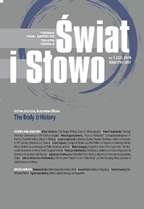Trylogia Eugenii Żmijewskiej jako przykład powieści psychologicznej
Eugenia Żmijewska’s trilogy as an example of a psychological novel
Author(s): Aleksandra BanotSubject(s): Social Sciences, Language and Literature Studies, Psychology, Studies of Literature, Polish Literature, Philology
Published by: Akademia Techniczno-Humanistyczna w Bielsku-Białej
Keywords: Eugenia Żmijewska;psychological novel;psychological novel;Bildungsroman;
Summary/Abstract: The trilogy of Eugenia Żmijewska (Little Flame, Fate, Sweetheart), published in the years 1907–1911, is a part of the popular novel at the beginning of the twentieth century about women growing to maturity. According to Grażyna Borkowska, the writer also emphasizes the topics of psychosexual maturation. The visibility of this aspect of maturation determines the originality of Żmijewska and her sense of modernist conventions, although the writer does not use such terms as intimate, corporal, or sexual. It is these problems that I look at in my article. I am interested in a much broader context of psychological (e.g. emotional, social) development during adolescence and early adulthood. I want to pay attention not only to the normative aspect of the process, but also to difficulties and disorders. Perhaps Żmijewska was an average writer, but she had good knowledge of the psychology of maturing girls and young women, especially at a time when psychology was a fairly new discipline of science.
Journal: Świat i słowo
- Issue Year: 1/2020
- Issue No: 34
- Page Range: 269-286
- Page Count: 18
- Language: Polish

